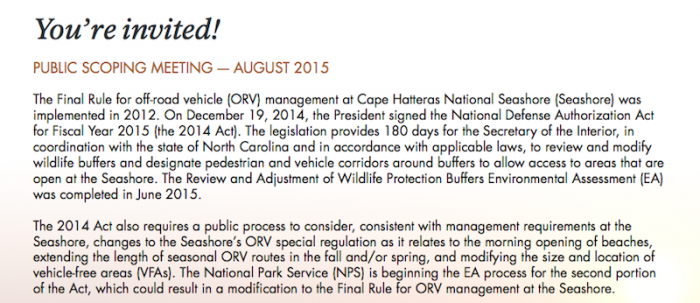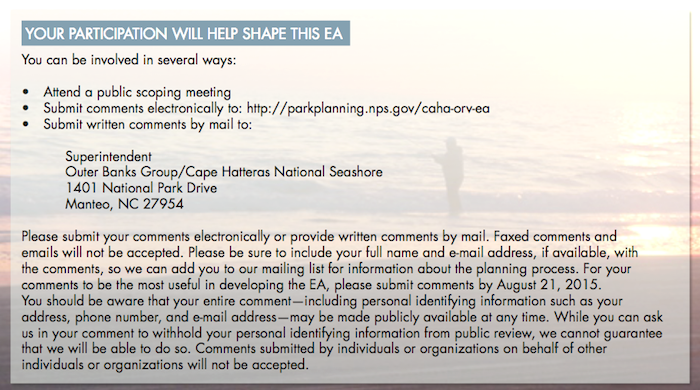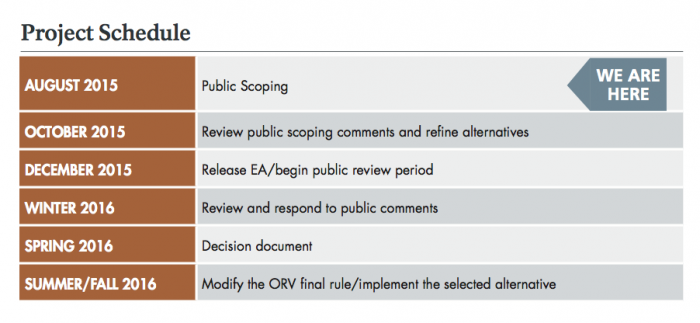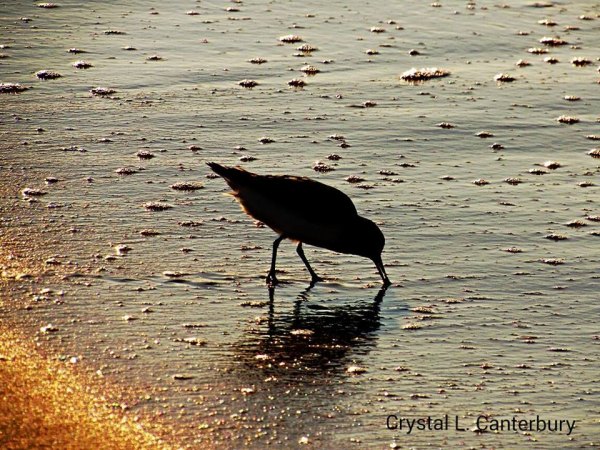Cape Hatteras National Seashore has started the scoping process to consider modifications to the Seashore’s Off-Road Vehicle (ORV) special regulation as it relates to morning opening of beaches, extending the length of fall and spring seasonal ORV routes, and modifying the size and location of vehicle free areas.
Public scoping will help inform the development of alternatives that will be analyzed in an Environmental Assessment (EA).
See information below on how you can comment and attend the upcoming public scoping meetings that begin on Wednesday, August 5, 2015. The newsletter includes information on the purpose of this planning effort and preliminary options for consideration. Please submit comments by August 21, 2015.
For more information, visit the National Park Service Planning, Environment and Public Comment (PEPC) website at: http://parkplanning.nps.gov/caha-orv-ea
The public meeting schedule is as follows:
Wednesday, August 5, 2015, 5:30 p.m. to 7:30 p.m. at the Ocracoke School
Thursday, August 6, 2015, 6:00 p.m. to 8:00 p.m. at the McKimmon Conference Center & Training Center, 1101 Gorman Street, NC State University Campus, Raleigh, NC 27695
Monday, August 10, 2015, 6:00 p.m. to 8:00 p.m. at the Cape Hatteras Secondary School, 48576 Highway 12, Buxton, NC 27920
Tuesday, August 11, 2015, 6:00 p.m. to 8:00 p.m. at the Hilton Garden Inn, 5353 Virginia Dare Trail, Kitty Hawk, NC 27949
Wednesday, August 12, 2015, 5:30 p.m. to 7:30 p.m. at the Embassy Suites Hampton Inn, 1700 Coliseum Drive, Hampton, VA 23666


Purpose and Need
PURPOSE
The purpose of the project is to consider changing seasonal ORV route dates, morning beach openings from nighttime closures, and the size and location of vehicle-free areas, as well as explore alternative permit options and access construction projects within the park.
NEED
Action is needed as a result of the National Defense Authorization Act for Fiscal Year 2015, which directs the NPS to undertake a public process to consider, consistent with management requirements at the National Seashore, the following changes to the Final Rule:
-
Opening beaches at the National Seashore that are closed to night driving restrictions, by opening beach segments on a rolling basis as daily management reviews are completed
-
Extending seasonal ORV routes for additional periods in the Fall and Spring if ORV use would not create resource management problems at the National Seashore, and
-
Modifying the size and location of vehicle-free areas.
Action is also needed to continue to improve ORV management at the Seashore, which could include changes to the existing ORV permit system.
Preliminary Alternative Elements
The park has developed preliminary options for the following five alternative elements. Are there any additional alternative options you would like the NPS to consider?
MORNING BEACH OPENINGS
Currently all ORV-accessible beaches open at 7 a.m., after resource management staff have marked the location of any new turtle nests, false crawls, or turtle hatches that have occurred overnight. The NPS developed preliminary options for opening beaches earlier than 7 a.m. These preliminary options are:
-
designating priority beaches that are cleared by resource management staff and opened at 6:30 a.m.
-
allowing visitors to follow resource management staff onto the beach at a designated ramp and to drive a safe distance behind staff as they clear the beach
SEASONAL ORV ROUTES
Currently, seasonal ORV routes, located in front of the villages and Ocracoke campground, are open from November 1 through March 31. An additional seasonal ORV route on Bodie Island is open from September 15 through March 14. That seasonal route period is due
to resource considerations, and park staff indicate that the current seasonal route period has been consistent with bird activity in that location. Therefore, the NPS would like to focus on the village and campground ORV route locations. For the seasonal ORV routes in front
of the villages and Ocracoke campground, the NPS preliminary alternatives include extending the ORV route period for:
• an additional two weeks in the fall and spring • an additional four weeks in the fall and spring • an additional six weeks in the fall and Spring • an extension in the fall only
VEHICLE-FREE AREAS
Current locations of VFAs and designated ORV routes were developed throughout the ORV management plan/environmental impact statement planning process, which concluded in 2010. Throughout that process, factors that were considered in designating ORV and pedestrian-only locations (or VFAs) included:
-
Proximity to villages, ensuring both the pedestrian and ORV visitor experience was available within a reasonable distance from each village
-
Presence of adequate parking, high-density day use areas, and lifeguarded beaches, which could better support VFAs
-
Resource management concerns, including the location of wintering shorebird activities
-
Providing for a balance between ORV areas and VFAs
What locations do you see as potential areas for modification?
ACCESS IMPROVEMENTS
Existing ORV routes and ramps were designated at these locations with the intent to provide access on either side of an ORV route to allow for reliable access, even if one ramp is unusable due to a resource closure. The 2010 ORV EIS also proposed new or expanded parking areas to improve pedestrian and ORV access. What are some key locations where changes to parking or ramp configurations could improve beach or soundside access?
PERMITS
Under the Final Rule, the NPS can only issue annual permits, valid for the calendar year, and seven-day permits. Based on visitor feedback, the NPS would like to explore different permit lengths, and some options being considered include:
• 3-day permits
• 10-day permits
• 14-day permits
• Annual permits, valid for a year from issue date
Are there any other permit periods you would like to see considered?


